Information/Write-up
"O Great Spirit whose voice I hear in the winds,
I come to you as one of your many children.
I need your strength and your wisdom.
Make me strong not to be superior to my brother,
but to be able to fight my greatest enemy:
"Myself"
--------------------------------------------------------------------------------
"We have taken so much from your culture,
I wish you had taken something from ours...
For there were some beautiful and good things within it.
Perhaps now that the time has come,
We are fearful that what you take will be lost....
I shall grab the instruments of the white man's success:
His education, his skills, and society.
If you talk to the animals they will talk with you and you will know each other.
If you do not talk to them you will not know them, and what you do not know you will fear.
What one fears one destroys."
Chief Dan George was a gifted actor and chief of the Salish Band in Burrard Inlet, British Columbia. He was born 'Geswanouth Slahoot', on July 24, 1899, in North Vancouver, British Columbia and died September 23, 1981, in Vancouver, British Columbia.
He first came to prominence in a supporting role as the Indian who adopts Dustin Hoffman in Arthur Penn's Little Big Man (1970); for which he received an Academy Award nomination. Dan also played the Old Sioux in the TV miniseries epic, "Centennial" (1978). He did a hilarious turn as Clint Eastwood's bumbling traveling companion in "The Outlaw Josey Wales" (1976).
Chief Dan George made several films in Canada and often added a dignified strength and depth to his roles in his brief, but impressive career.
Although Indigenous and critical responses have varied since its first production, the play is seminal in the history of modern Canadian drama. The Ecstasy of Rita Joe recounts the story of a young Indigenous woman who comes to the city to find freedom from the limitations of reserve life, only to experience racism, marginalization, and finally rape and murder. This contemporary tragedy condemns the brutality of a system that limits, rejects, or sentences Indigenous people to lives of social and spiritual poverty, that takes away their pride, their traditions and their language. The death of Rita Joe comes as a consequence of the imposition of a colonizing power on Indigenous peoples.
The story is told in songs, montages and disconnected scenes -- in a stream-of-consciousness style which collapses past and present, as Rita Joe recalls her youth on the reserve during her arraignment in court on charges of prostitution. Events and characters are presented from her point of view, as the salient moments of her life are replayed just before her moment of death. Her "ecstasy" is an ironic allusion to the euphoric state of enlightenment experienced by a Christian martyr before her reunion with God.
Ryga effects this collapsing of time through the set design -- a circular ramp that encloses the present, with a cyclorama to evoke the past. Lighting effects isolate characters and cast shadows of prison bars across Rita Joe as she sleeps, creating a mood of fear and claustrophobia. This "expressionist" style and form projects the state of mind of the protagonist, externalizing feelings through action and image. Ryga portrays the helplessness of the individual in the face of large social and political forces. The structural metaphor of The Ecstasy of Rita Joe is that of the trial -- of Rita Joe, but more significantly, of the audience.
The characters, particularly the white antagonists, tend to be stereotypes representing large, impersonal forces -- the law, the church, white "do-gooders." The portrait of Rita Joe is more complex: she is insecure and defiant, caught between two cultures.
Chief Dan George: voice
Peter Haworth: voice
Ann Mortifee: vocals, guitar, voice
Paul Horn: flute
Robbie King: electric piano
Doug Edwards: bass guitar
Kat Hendrikse: drums
Arranged by Wolfgang Knittel
Additional arrangements by Paul, Ann, Doug, Robbie, and Kat
Music written by Ann Mortifee
Words written by George Ryga
Musical direction by John Avison and Ann Mortifee
Produced by Len Lythgoe and Jim Morrison
Engineered by Tap Suo Anttila and Don Geppert
Mixed by Don Geppert and Eirik The Norwegian
Executive producer: Rod Booth
Cover painting and album design by Frank Lewis
Photography by Jim Morrison
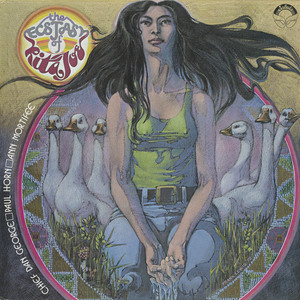
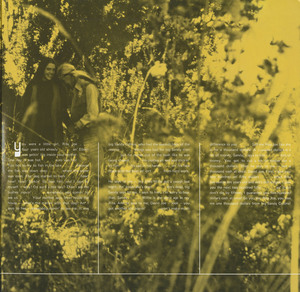
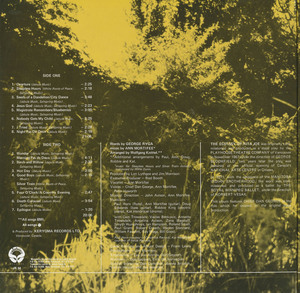
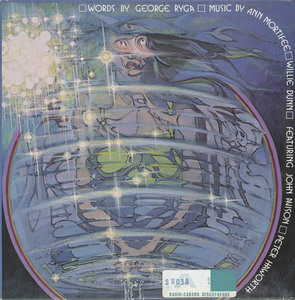
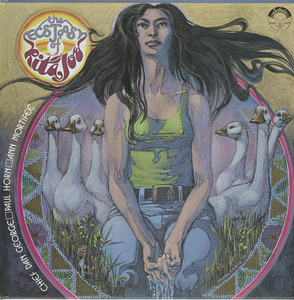
No Comments